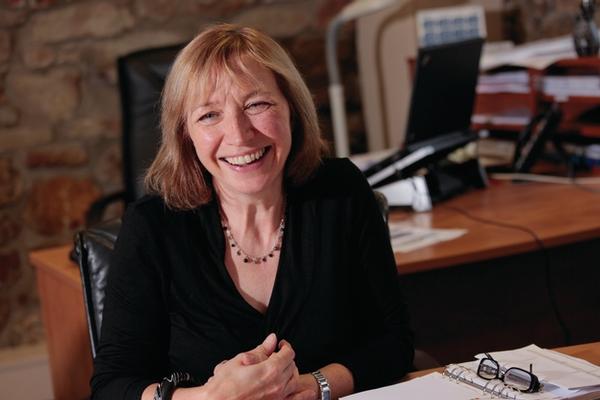Angel of the north
After five years away from the housing sector, Jo Boaden is back as the new chief executive of the Northern Housing Consortium. Isabel Hardman finds out how she intends to fight the region’s corner.
Jo Boaden squirms each time she tries to describe how it feels to return to the housing sector.
She’s clearly pleased to be back as she takes the helm at the Northern Housing Consortium, but whenever she tries to explain how happy she is to be working among so many passionate people, she stops mid-sentence, cringes, and says: ‘I can’t say that: it’s far too cheesy.’
Former housing market renewal pathfinder leader Ms Boaden joined the consortium from private sector consultancy Business Enterprise North East five weeks ago. She is well aware that her new job will be far from easy, starting as she has at such a transformative time for housing. The calm, collected Liverpudlian is tasked with ensuring the consortium’s ‘voice of housing in the north’ remains loud and clear as the government embarks on a series of reforms that will change the sector forever.
There’s little chance this voice will be a brash, shouty one: throughout her interview Ms Boaden is extremely careful not to burn her bridges with the new government by launching into a stream of invective about its plans for housing.
Given that some of her 400-odd members - social landlords from across the north - may favour a more unbridled mode of expression, can their new mouthpiece deliver?
Sitting in her large office overlooking the River Wear on the outskirts of Sunderland, she cautiously explains that the consortium is keen for more detail both on spending and policy direction before it snaps to any reaction. She is also conscious that her organisation, run previously by the well-known John Moralee, enjoys an extremely productive relationship with ministers and civil servants currently. She is at great pains to preserve it.
Meetings with the Communities and Local Government department in the run-up to the spending review were very encouraging, she says, adding that civil servants are open to the consortium’s suggestions. It’s a positive spin: the north, with its high levels of public sector employment and benefit claims, was judged by some to have fared worst from the cuts. However Ms Boaden doesn’t stop short of criticism altogether: ‘The government’s attitude to social housing is rather negative at the moment. We need to make the case that housing has a huge role and is a positive force. It’s about ensuring that we can put housing at the centre of things in a way that shows it is part of the solution, rather than the problem.’
Promoting the north
To that end, the consortium, which employs 32 staff and had an annual turnover of more than £2 million in 2009, will be promoting the role that housing can play in the Tory party’s ‘big society’ project. Its Northern Housing Summit next week will focus on the implications of this flagship policy for the sector, and how housing can engage with the wider community.
Making a case for the north also includes ensuring the region’s unique challenges don’t get ignored by Whitehall policy-makers, she says.
‘There is a real danger of a widening of the gap between the north and the south which had begun to close,’ she says. ‘There has been a real loss of some of the positive opportunities for housing in the north.’
She argues that some of the government’s recent policy announcements will have a very different impact for northern housing providers than their southern counterparts. ‘There are decisions that are being taken now that may well have some unintended consequences for the north that will be very difficult to unpick.
‘We need to be providing information on how this will work in the north, because it will be very different up here to the effects down south.’
The new ‘affordable rent’ that the government says will bankroll future affordable homes, for example, may play out very differently in some parts of her region than elsewhere, she warns.
‘There isn’t a huge difference between social rents in the north and a rent at 80 per cent of the market rent. It might not bring a massive income stream to some parts of the north.
‘We have got some tenants who can meet [higher levels of rent] through their own resources, and others who will need support. There is going to be a real issue about how all of this comes together for new build numbers and accommodation more generally. We need to remember that we are talking about people’s homes here.’
Still cautious and considered, she says government plans to combine the affordable rent with a tenure shake-up could damage communities,
but acknowledges landlords must bear some responsibility for this state of affairs. ‘We have not been very innovative on some of the issues on how you move between tenures. I do not mean to say that nothing should be changed: I just think that removing people who are more affluent from social housing and leaving just the poor can have a massively negative impact on the local community. That’s one of the things the [housing market renewal] pathfinders were set up to change.’
She lists more problems the north faces: ‘There is greater health inequality, more Neets [people not in employment, education or training] and higher unemployment. The housing market is depressed. There are also issues around energy efficiency and how you retrofit many of the pre-1919 terraces in the region.’
Experienced hands
Plenty of persuading to be done then. Ms Boaden appears undaunted - she’s used to charming government officials to hand over much-needed funding. From 2003 to 2005 she was director of the north east’s pathfinder Bridging Newcastle Gateshead, where funding was under constant pressure because its demolition and rebuild programme was not initially popular.
Now the body is under threat, with a number of other pathfinders announcing closure, or merging with other organisations after their funding was dissolved into a single larger regeneration pot. How does she feel about the potential demise of the programme?
‘I do not think it would be very beneficial for them to lose funding when they are beginning to show results and they are really beginning to work the market in many areas,’ she says.
Her stint as chief executive of The North East Regional Assembly between 2005 and 2007, has taught her some valuable skills: she describes it politely as ‘challenging and sometimes frustrating’. Seeing the coalition government abolish regional structures was more frustrating still.
‘I am concerned about how everything is going to play out, having lost that regional infrastructure and those levels of regional governance. There are some benefits in terms of flexibility and freedoms for local authorities, but it’s working out how house numbers are actually going to stack up that is the challenge.’
Lobbying central government isn’t the only challenge, though. Times are hard now, and the 397 housing associations, local authorities and arm’s-length management organisations that comprise her members are facing unprecedented budget cuts and a shake-up in the way they are funded through the new ‘affordable rent’ and reform of the housing revenue account.
Looking after members
Is Ms Boaden worried that some will allow their membership to lapse in order to save money? Though she is aware that all organisations are starting to count their pennies, Ms Boaden is not losing sleep over a potential mass exodus. One of the mainstays of the consortium’s argument is that its members don’t just gain a voice, but also practical help.
‘The role of the consortium is now - more than ever - vital to our membership in supporting them through the difficult times and helping them go through any efficiencies that they need to make,’ she says. ‘We are not just about the message: we are about practical help.’
This includes the massive savings brought about by its procurement group. In the past three years the consortium has saved its members
£45 million through the group; some chief executives joke this means they can now afford the significantly higher membership fees charged by some other industry bodies.
Members are looking for more from Ms Boaden than money in their pockets, welcome though that is.
‘The challenges facing her are bringing all housing organisations together in all northern regions on a common agenda and supporting members to make a difference in these stretching times for communities,’ says Jon Lord, consortium member and chief executive of Bolton at Home.
He adds: ‘I feel very confident in the appointment of Jo. I’m sure she will be an excellent leader for the Northern Housing Consortium.’
Karen Anderson, strategy and information manager at the Homes and Communities Agency, who worked with Ms Boaden at Bridging Newcastle Gateshead, is also upbeat. ‘I have found Jo a very inspirational, creative and a can-do type of person who wanted to work with the partners to get things done.’
The lady herself is clearly on message then when she, without a trace of a cringe, she says: ‘I really do want to make a difference to our members and through our members to tenants. It’s an extremely exciting time to be doing this job.’
Five things you didn’t know about Jo Boaden
- She is a keen ballroom dancer, having taken up the hobby a few years ago with her husband.
- She has recently started running again (although she admits that today stayed in bed rather than braving the rather sharp weather).
- She has a daughter and a son - who is about to move abroad
- She started work as an environmental health officer in Glasgow
- She grew up in Liverpool








